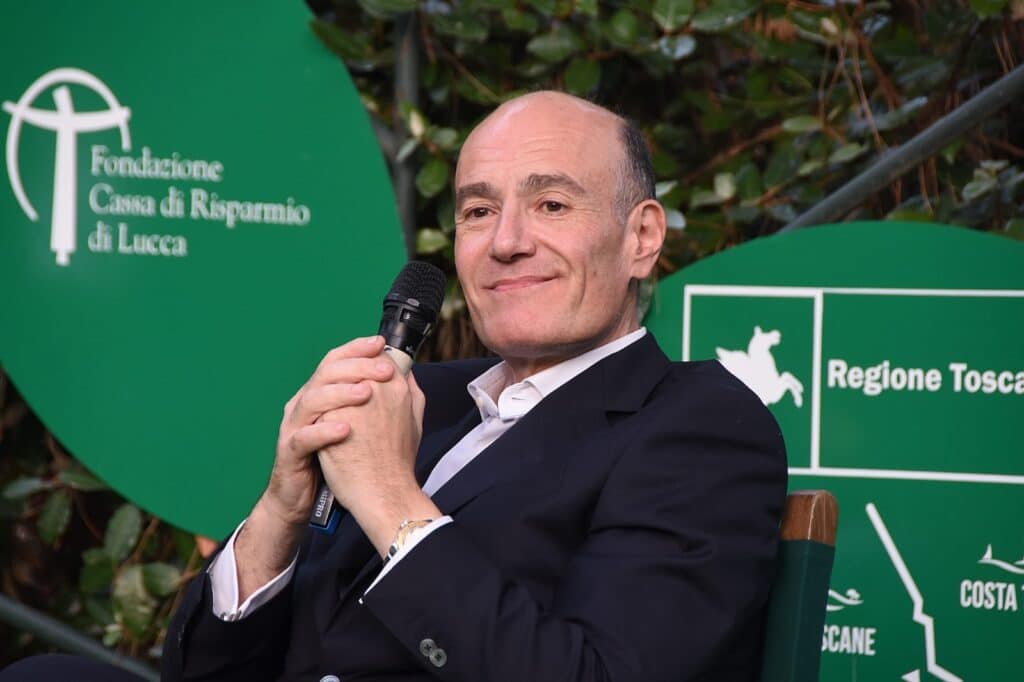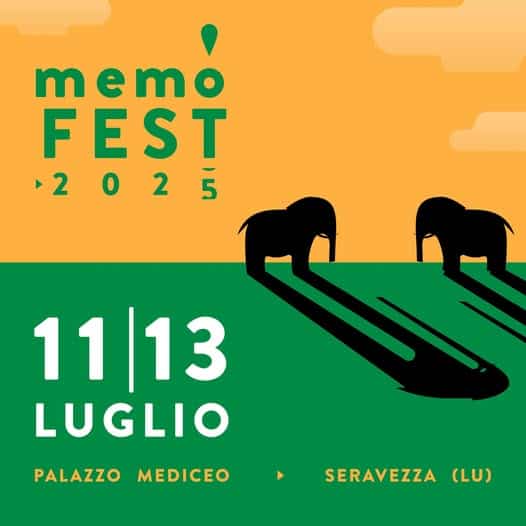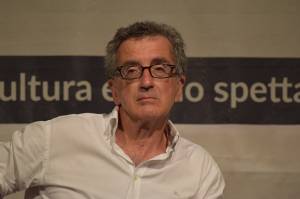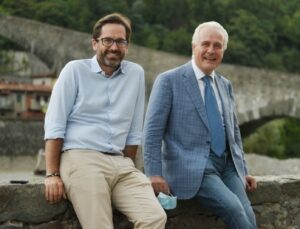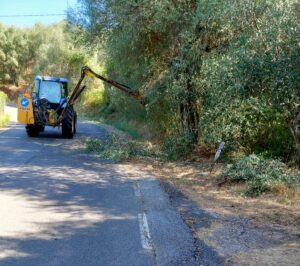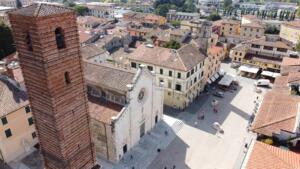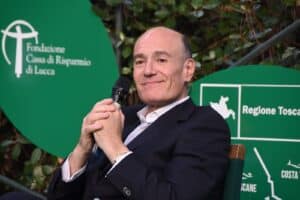 VIAREGGIO. They say you cannot ever forget your first love. This may turn out to be true also for books. And this applies to Irish novelist Paul Kestell (pictured left) as well. The Dublin-originated writer, aged 53, has recently published his second book, “Wood Point”, a fiction story set in an imaginary village in West Cork. Nevertheless, he still feels a special fondness for his debut novel “Viaréggio”, the title referring to the homonym seaside place on the northern shores of Tuscany.
VIAREGGIO. They say you cannot ever forget your first love. This may turn out to be true also for books. And this applies to Irish novelist Paul Kestell (pictured left) as well. The Dublin-originated writer, aged 53, has recently published his second book, “Wood Point”, a fiction story set in an imaginary village in West Cork. Nevertheless, he still feels a special fondness for his debut novel “Viaréggio”, the title referring to the homonym seaside place on the northern shores of Tuscany.
Trying to confine “Viaréggio” inside a specific genre of books is like encaging a wild, free animal, as the novel traverses different boundaries. The Irish World has defined it an “existential thriller”, still there are some punctual cross-references to the dark side of Irish history – the IRA – and even to some deviant characters from the CIA, the FBI and Italian mafia. Moreover, the novel comprises autobiographical features, as the main character is a writer – like Kestell. On a secondary level, it could also be considered a guide to the most charming locations in Tuscany, visited by Kestell in person four times.
“Viaréggio” is the story of Stephen, a would-be novelist who has just recovered from a heart by-pass and is seeking inspiration to write. Quintessentially, the plot is the retrospection on his life, an analysis of major moments such as love relationships, his marriage to Lucia and the care of their children. Reminders of these happy events compensate for his gloomy view of the world, portrayed as it is dominated by dark forces, a consequence of his illness. “Still, the beautiful landscape of Tuscany will stimulate the imagination of Stephen as a writer,” Kestell reassures. “More importantly, it will help him in discovering the hidden side of his creativity”.
Why did you set the story in Viareggio?
“I have a special affinity for this town. It’s a very beautiful and joyful location. I liked the beach, with all those sellers of jewellery and towels. Broadly speaking, it turned out to be a lovely place and I found very friendly people here. I thought it was a good idea to keep Stephen away from dark, wet Ireland, and to imagine him resting in Viareggio, midst all its charms.
“But as the novel develops there is a marked contrast between the cheerful atmosphere of the crowded beach and the instability of Stephen, whose mind begins to invent this dark and moody thriller.”
Are there other cities and towns you like?
“Oh, I love Tuscany as a whole. In particular, I liked Bagno Vignoni, San Donato in Poggio and Volterra. Here you can admire the soul of the region, which traces back to the middle ages.”
Many locations, but in the end you chose Viareggio for the title – why?
“I was in a holiday cottage in West Cork, where I spent a couple of years working on the drafts. I was composing the work, and that name, Viareggio, suddenly jumped into my mind. It started to tickle my imagination…Viareggio, Viareggio…that’s a beautiful, uncommon name. The photo on the cover of the book was taken from the roof of a hotel on the promenade by the sea.”
When did you visit Viareggio?
“I came for the first time in 2006, for a holiday. It happened by accident. My partner at the time picked the location, as we had already been to Italy but inland, near San Gimignano. Once our holiday ended, I conceived the idea of the book and I decided to locate the novel in Viareggio. Then, as I started to mould it, I returned in the summer of 2009.”
Do you know what occurred in the city on that year?
“Do you mean the train disaster? Yes, I read about it. It was horrible and I was absolutely touched, as for so long I saw Viareggio as a paradisiac place. I was back in Viareggio before the tragedy took place. I remember I used to walk up to the railway station. But I never caught a train, as we hired a car to travel around Tuscany.
“If you type ‘Viareggio’ on Google Ireland, the first outcomes refers to the terrible disaster. It really puts everything into perspective.”
Maybe we should talk about something less sad. I read that, alongside writing, football is another big passion of yours.
“Yes definitely. The book opens with a scene from the roof top terrace of the hotel where Stephen and Lucia are observing the happy mood of people in the streets, who are watching the 2006 World Cup football match between Italy and the USA on big screen. Oh, fond memories…”
Do you know the head coach of that national team, Marcello Lippi, is from Viareggio?
“Yes, I also read about that.”
What about Ireland national team manager Giovanni Trapattoni?
“He is really a good man- will this be his swan song?
The upcoming European Championship could be a tasty opportunity, as Ireland will encounter Italy in the group stage. Who will win?
“That’s a difficult question. Ireland beat the Azzurri 2-0 in a friendly match last year, but as they say this is a different ball game. Ireland will surprise many people in this tournament, despite the fact that most of our footballers play in England where the game has gone sterile.
“We have an unusual bond amongst our players and coaching staff and it will ignite at times on the field, especially when Ireland are regarded as underdogs. The bigger they come, the harder they will fall.
“We also have some very good players like Robbie Keane and Shay Given, together with some really exciting new talents knocking on the door. I think Ireland will get through to the knockout stages. Against Italy, we will draw or win.
 Oh, we will see. Let’s go back to Viareggio. What else do you know about the city?
Oh, we will see. Let’s go back to Viareggio. What else do you know about the city?
“I discovered you have a famous Carnival. Sadly, I’ve never been there.
“To be honest, another reason behind the decision to choose that title is linked to the story of poet Percy Bysshe Shelley, whose body was found on the beach in Viareggio. It really grabbed my attention. Not by chance, there are some connections between my novel and aspects of that episode as well as of Shelley’s life.
“Shelley was a romantic, but he was also like me in that he was very political. There is a link between my character Stephen’s view of the world and Shelley – that’s why Stephen dreams of Shelley’s body burning on the beach- and the correlation with the heart and Mary Shelley, and how she wanted his heart kept with her for eternity.”
As we are talking about literature, have you ever heard the Viareggio-Rèpaci Literary Prize?
“Yes, I’ve read something on the subject. I realised it was very important back over the years, whereas it seems to have lost part of its lustre nowadays, has it? Maybe I can enter the novel for this prize – it would be ironic if a novel called ‘Viaréggio’ were to win it?”
Click here for the Italian version – Clicca qui per la versione in italiano

